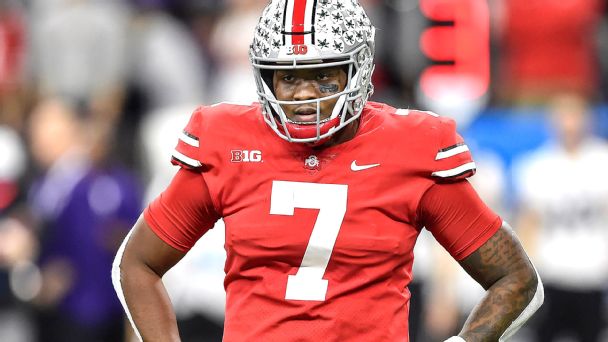How drafting Jarrett Stidham affects Patriots’ QB plans

Damien Woody evaluates the players New England added in the draft, including wide receiver N’Keal Harry. (1:23)
FOXBOROUGH, Mass. — Within a few hours after the New England Patriots selected Auburn quarterback Jarrett Stidham in the fourth round of the NFL draft, one of the players who could be most affected by the decision took the field at Gillette Stadium for some extra work.
Danny Etling, the former LSU quarterback selected in the 2018 seventh round, went through a warm-up for the first time since the competition at the backup spot to Tom Brady notably changed.
• Haskins eager to end Redskins QB futility
• Inside TE Rudolph’s future with Vikings
• Are Jets finished with LB Darron Lee?
• Expectations for Lions rookie TE Hockenson
• Meet Todd Gurley’s insurance policy
Stidham’s arrival as the 133rd overall pick locks him into a roster spot behind Brady barring an unexpected turn of events. The question is whether there will be a third quarterback joining Brady and Stidham, with Etling and veteran Brian Hoyer potentially battling it out for that one spot.
The altered outlook at quarterback is a good example of the immediate trickle-down effect that a draft pick has on those already on the team.
As for what the Patriots do this season, history in the coach Bill Belichick era can serve as a helpful guide. In years when they don’t draft a quarterback in Rounds 3-4, they usually keep just two quarterbacks on their final roster. But when they have drafted a quarterback in the third or fourth round, the club has always kept three signal-callers on their initial 53-man roster.
In 2002, it was rookie Rohan Davey (fourth round) and veteran Damon Huard. In 2008, rookie Kevin O’Connell (third round) joined four-year veteran Matt Cassel. In 2011, it was rookie Ryan Mallett (third round) and Hoyer (then in his third season). And in 2016, rookie Jacoby Brissett (third round) joined third-year man Jimmy Garoppolo.
Belichick, of course, might also point out 2000 when the Patriots took the unconventional step of keeping a fourth quarterback, because there was a sense that rookie Tom Brady (sixth round) might turn into something special.
As for 2019, if Stidham shows he is a quick study, there remains a chance the club could keep just him and Brady.
With the selection of Stidham as a springboard, and how that affects others on the team, here is a position-by-position breakdown of the roster (rookies are in italics):
Auburn’s Jarrett Stidham has adequate size, good arm strength, above-average mobility and can drive the ball vertically down the field.
Brady, Hoyer, Etling, Stidham
Hoyer enters the last year of his contract, with a base salary that rises from $915,000 in 2018 to $2.8 million in 2019.
Sony Michel, James White, Rex Burkhead, Damien Harris, Brandon Bolden, Nick Brossette
Harris, a third-round pick from Alabama, will make the team and provide insurance behind Michel in the traditional No. 1 spot.
Johnson, as part of the NFL’s International Pathway program, doesn’t count against the 90-man roster.
Julian Edelman, N’Keal Harry, Phillip Dorsett, Demaryius Thomas, Braxton Berrios, Maurice Harris, Matthew Slater, Bruce Ellington, Damoun Patterson, Ryan Davis, Jakobi Meyers, Xavier Ubosi
Berrios, a 2018 sixth-round pick from Miami who spent his rookie season on injured reserve, has a great opportunity ahead to prove he can become a reliable slot option.
Austin Seferian-Jenkins, Ryan Izzo, Matt LaCosse, Stephen Anderson, Andrew Beck
Similar to Berrios, there is a great opportunity ahead for Izzo, the 2018 seventh-round pick from Florida State. It’s easy to forget that Izzo was viewed favorably enough to make the initial 53-man roster last season before moving to injured reserve shortly thereafter.
Isaiah Wynn, Marcus Cannon, Yodny Cajuste, Cole Croston, Dan Skipper, Cedrick Lang, Ryker Mathews
Wynn’s recovery from a torn Achilles in August is a critical storyline in the transition at left tackle from Trent Brown.
Joe Thuney, Shaq Mason, Hjalte Froholdt, Ted Karras, Brian Schwenke, Tyree St. Louis, Calvin Anderson
The top competition comes with the backup spots, with fourth-rounder Froholdt locked in.
David Andrews, James Ferentz, Jake Eldrenkamp, Tyler Gauthier
Gauthier, of Miami, received $70,000 guaranteed as an undrafted signing, which reflects he had options from other teams.
Lawrence Guy, Mike Pennel, Adam Butler, David Parry, Byron Cowart, Frank Herron
Pennel inked a two-year deal with a base value of $5 million and is the leading candidate to replace the departed Malcom Brown.
Michael Bennett, Deatrich Wise Jr. Derek Rivers, Keionta Davis, Ufomba Kamalu
It’s a one-for-one exchange with the 33-year-old Bennett to be relied upon to help fill the void of Trey Flowers‘ free-agency departure.
Dont’a Hightower, Kyle Van Noy, John Simon, Chase Winovich, Trent Harris
The entire group returns and is supplemented by Winovich, the third-round pick from Michigan
Ja’Whaun Bentley, Elandon Roberts, Christian Sam, Calvin Munson, Brandon King, Terez Hall
Bentley, the 2018 fifth-round pick from Purdue, had flashed last year before landing on IR in Week 3 with a torn biceps.
Stephon Gilmore, Jason McCourty, Jonathan Jones, J.C. Jackson, Duke Dawson Jr., Joejuan Williams, Keion Crossen, Ken Webster
Arguably the deepest position on the roster, which sparks the “you can never have enough cornerbacks” discussion.
Devin McCourty, Patrick Chung, Duron Harmon, Terrence Brooks, Obi Melifonwu, Nate Ebner, A.J. Howard, Malik Gant
Every player returns, with Brooks projected to help on special teams and possibly in specific defensive packages after signing a two-year, $4 million pact.
Bailey has a powerful leg, and after the Patriots traded up four spots in the fifth round to select him, he is a legitimate challenger to Allen’s job.
After signing a two-year, $8.5 million deal as a free agent this offseason, he’s locked in.
More continuity among specialists.